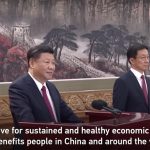Our understanding of Earth — and how we’re changing it — just keeps expanding.
Earth Day turns 48 today, April 22, and Google is celebrating it with a Google Doodle of conservationist Dr. Jane Goodall, who nudges us in a video a “do our part for this beautiful planet.”
When Senator Gaylord Nelson (D-Wisc.) founded Earth Day in 1970, his hope was to make the environment a political issue in an era where US rivers caught on fire and thick smog choked cities.
In many ways, it worked. Since then, major environmental laws have helped clean up much of the vivid toxic detritus in the soil, air, and water in the US. But our challenges today are no less daunting. The accumulation of greenhouse gases in the atmosphere, the loss of wilderness and species, and the acidification and pollution of the oceans have all become more acute — and more destabilizing.
In keeping with the tradition started by former Vox writers Brad Plumer and Joseph Stromberg, here are seven of the most troubling, intriguing, and encouraging things we learned about the Earth since the last Earth Day.
https://www.vox.com/2018/4/21/17247994/earth-day-2018-plastic-climate-change







